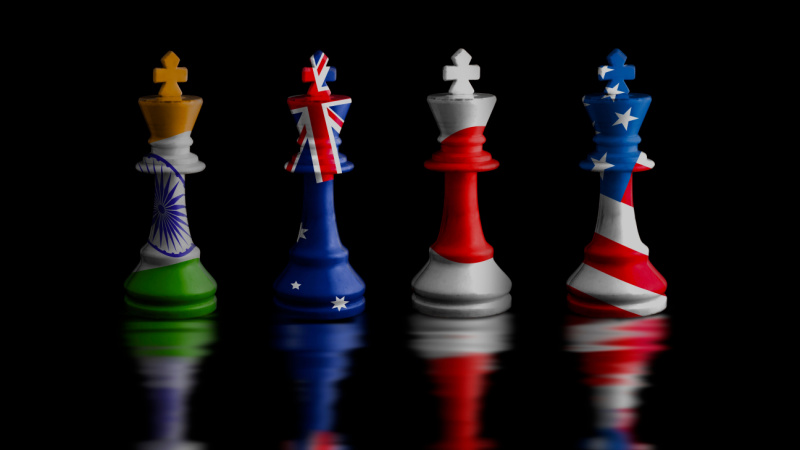No Biden. So how relevant is the Quad?
May 17 2023

Note: This article appeared in 360info on May 17 2023. It was republished in The Canberra Times on May 21 2023.
The fact that US President Joe Biden judged there was no real choice but to prioritise domestic politics over attending the Quad summit in Sydney, which then led to the entire event being cancelled, highlights just one of the group’s limitations.
The Quad regularly attracts excited commentary to the effect that four of the world’s most powerful democracies are rising to the threat posed by an increasingly uncompromising China.
At the first ministerial-level meeting of the Quad in 2019, then US Secretary of State Mike Pompeo gave this narrative a head of steam: ‘We’ve reconvened ‘the Quad’ – …This will prove very important in the efforts ahead, ensuring that China retains only its proper place in the world.’
Since winning government last May, Australian Prime Minister Anthony Albanese has embraced the Quad too. His first act as prime minister was to attend last year’s leaders’ summit in Tokyo and when announcing that Sydney would be the host this year, he said he was ‘honoured’ and that ‘leveraging our collective strengths helps Australia advance its interests’.
Yet at the same time, Canberra has also been able to not just ‘stabilise’, but modestly improve, Australia’s relationship with China. Squaring that circle owes much to the Quad having left its original billing as a ‘security dialogue‘ behind, even if excited commentary has not quite caught up.
In 2020, at another meeting of Quad foreign ministers, Pompeo was still insistent its purpose was to ‘counter the challenge that the Chinese Communist Party presents to all of us’.
But none of Pompeo’s counterparts even mentioned China in their opening remarks.
Australia’s then-foreign minister, Marise Payne instead homed in on the Quad’s ‘positive agenda‘ and described it as a ‘diplomatic network’.
A Japanese government spokesperson said he was not sure what Pompeo had meant.
By the time of the first leaders meeting in March 2021, and with the Trump administration having lost office in the US, it was clear where the new consensus position lay.
The ‘Spirit of the Quad‘, the four leaders said, involved supplying a ‘positive vision’ for the region. Take a look at the website of the Australian Government’s Department of Foreign Affairs and Trade today and you’ll read about the Quad having a ‘positive, practical agenda to respond to the region’s most pressing challenges’.
These include, ‘COVID-19 vaccines, climate change, infrastructure, critical and emerging technology, cyber security, humanitarian assistance and disaster relief, space, maritime security, countering disinformation, and counter-terrorism’.
Some of Beijing’s uncompromising behaviour is seen in these areas, but this is a far cry from a hard-edged Quad that China hawks saw as being within reach just a few years ago, and which some urge the group to recapture.
Several factors explain the hard-edged Quad’s demise. India’s increasing self-assuredness could be perhaps the most significant.
Despite having its own acute challenges to manage with Beijing, New Delhi appears to not feel the need to fall into line with Washington or Tokyo, and certainly not Canberra.
Consider New Delhi’s divergent response to Russia’s invasion of Ukraine last February. Not condemning Moscow’s actions is just the start.
Six months after the war began, Indian Prime Minister Narendra Modi met with Russian President Vladimir Putin and while stating that ‘today’s era is not an era of war’, nonetheless described the two countries as having an ‘unbreakable friendship’.
Indian Foreign Minister S. Jaishankar then visited Moscow and said that in recent years the two sides ‘have been finding ways of expanding this relationship’, while describing the India-Russia bilateral as among the ‘steadiest‘ of major global powers.
This year, New Delhi opted out of discussions on the trade pillar of the Biden administration’s Indo-Pacific Economic Framework, despite its end point expected to be non-binding. But it has confirmed ‘advanced negotiations‘ with Moscow over a bilateral Free Trade Agreement.
The preferences of China hawks aside, there’s nothing wrong with Quad now having a ‘positive agenda’. It does, however, set up the challenge of delivering on that agenda – a tall order given it is so dizzyingly expansive.The early signs are not encouraging.
In March 2021 the Quad governments announced a ‘Vaccine Partnership‘ that would provide ‘at least one billion [COVID-19] doses…by the end of 2022’.
The idea was to draw on US technology, Japanese financing and Indian manufacturing. Therein lies the first problem: Australia had little to offer, being relegated to a brief mention of contributing ‘US$77 million for the provision of vaccines and ‘last-mile’ delivery support’.
The next issue was speed. The first Quad vaccine shipment was not made until April 2022, to Cambodia, and this was only 325,000 doses.
Just as the ‘partnership’ was announced, India was struck with a viral wave and New Delhi responded by imposing an export ban on vaccines to prioritise domestic availability. The ban was not lifted for seven months.
Quad governments had also bet on a single vaccine formulated by a single US company to be produced at a single facility in Hyderabad. This is understandable given bureaucrats had been tasked with orchestrating a supply chain about which they had no experience, but it was a failure-in-waiting from a project planning and risk management perspective.
Their bet hit trouble when the US Food and Drug Administration restricted use of the vaccine over concerns it could cause blood clots and the Indian government refused to sign a liability waiver.
The Quad’s eventual inaugural donation to Cambodia was made via a channel separate from that originally planned and by then doses had become so plentiful an Indian expert told The Hindu the problem was that, ‘donors are trying to find willing recipients’.
This should have been a learning experience for the Quad leaders: lay off chasing headlines and spinning narratives and stick to where real value can be added.
One proposal floated at last year’s Quad summit, a Maritime Domain Awareness initiative, has genuine appeal because the region is prone to natural disasters and smaller states often lack the capacity to combat scourges like illegal fishing.
Others, such as ploughing resources into cooperating on critical and emerging technologies, should be approached with similar scepticism as vaccines.
Of course, harnessing the potential of these technologies, and managing the associated risks, is important. But setting technology standards, for example, can’t just be about four players. And in some technologies, the global leader isn’t found within the Quad. In clean-energy supply chains, the essential partner is China.
This is why whenever and wherever the next Quad leaders meeting does happen, take any claims beyond it being a diplomatic achievement with a grain of salt.
Professor James Laurenceson is Director of the Australia-China Relations Institute at the University of Technology Sydney.

